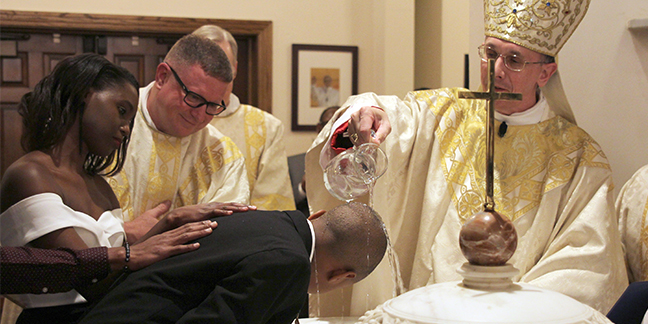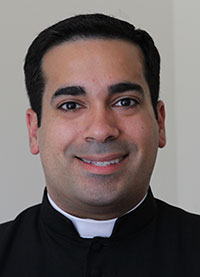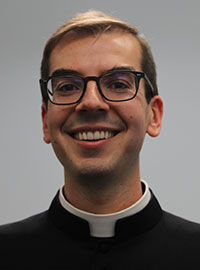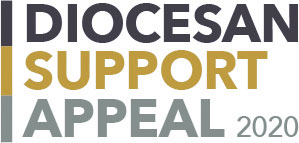Elect now hope to enter Church at Pentecost
 CHARLOTTE — Because churches have canceled public Masses and large events in response to the pandemic, the date for receiving people into the Church – including many college students who have been supported by Catholic Campus Ministry – has been pushed back.
CHARLOTTE — Because churches have canceled public Masses and large events in response to the pandemic, the date for receiving people into the Church – including many college students who have been supported by Catholic Campus Ministry – has been pushed back.
Baptisms, first Holy Communions and confirmations for candidates and catechumens, usually held during Easter Vigil liturgies, have been postponed until Pentecost on May 31, assuming that public health restrictions are lifted.
“The vigils of Easter and Pentecost are linked, bound together by the fulfillment of the Paschal mystery and the birth of the Church,” explained Monsignor Patrick Winslow, vicar general and chancellor of the diocese. “It is a fitting time to administer the sacraments and receive new members into the Church.”
Catholic Campus Ministry at Western Carolina University in Cullowhee and at UNC-Greensboro have been preparing 15 students to enter the Church. Like parishes, they had a number ready to be received at the Easter Vigil. But since universities closed due to the coronavirus, continuing RCIA formation has changed to virtual classes and one-on-one sessions.
“The coronavirus has certainly presented us with challenges, not only in how we provide for the formation of our students, but also in the practical aspect of administering the sacraments to them,” said Deacon Matthew Newsome, campus minister at Western Carolina.
Of the nine people in his RCIA program, three catechumens were to be baptized and four candidates were expected to come into the Church at Easter.
As the situation evolved, “it became apparent that Easter reception would not be possible, and my focus shifted to, ‘How can I assure them that they haven’t been forgotten about?’” Deacon Newsome said.
He said he has always had a flexible approach to RCIA in campus ministry, because the students he works with have schedules that don’t fit easily within a typical parish RCIA program. That made it easy for him to adapt to remote meetings, though it “is still no substitute for in-person gatherings, where we can pray together and communicate more openly.”
 How to contribute to the DSA
How to contribute to the DSA
YOUR DSA CONTRIBUTIONS AT WORK: The Catholic Campus Ministry and RCIA programs are among those funded in part by the annual Diocesan Support Appeal. Learn more about the DSA and how to donate online at www.charlottediocese.org/dsa.
Deacon Newsome has been keeping in touch with more frequent emails, updating students about the Church’s response to the pandemic, and giving them ways to continue to engage in their newfound faith from home.
Amy Kalayjian, who is pursuing her master’s degree at WCU, met Deacon Newsome last semester. She had been attending Mass for several years, but was not able to participate in a Campus Ministry program as an undergraduate.
“I had never had a very strong spiritual upbringing, and I never felt a strong connection to any religion or any major motivation to pursue a spiritually fulfilled life,” she said.
She started attending Mass with her parents as a senior in high school and felt drawn to the Church, its teachings, its approach to prayer and worship, and its charity work. Her mother converted while Kalayjian was an undergraduate.
A hard part of her journey had been attending Mass regularly – “really integrating that into my life when I hadn’t done that for years” – and then having Mass taken away due to COVID-19 pandemic, she said. The transition to remote RCIA has also been challenging, she said, but Deacon Newsome has done a good job of keeping everyone on track.
Gregg Cecconi, campus minister at the University of North Carolina-Greensboro and two other Greensboro-area colleges, said that before the pandemic closures, he and RCIA candidates met once a week either at the Smith Campus Ministries Center at UNC-G or at St. Pius X Parish with its RCIA group. Now they are using GroupMe, a group messaging app, Google Hangouts for online sessions, as well as online materials from Symbolon, Word on Fire and the St. Paul Center, and YouTube videos from Father Casey Cole, OFM.
Brianna Sheagley, a senior in UNCG’s computer science program, was excited about entering the Church at the Easter Vigil. She had attended several Protestant churches before finding out about Catholic Campus Ministry. Despite feeling close to God, she said she never found a place that felt like home. Sheagley says she “prayed for God to show me where He wanted me to go. … I knew He wanted me to go somewhere.”
At the beginning of last semester, she was walking through the Elliott University Center when she saw a big banner: “Catholics on Campus.” She mentioned it to her mother, who found the Campus Ministry’s website and encouraged her daughter to check it out.
“I saw a mention of the Catholic Lounge on the website at the beginning of the semester, so I decided to just go there and study and see how I felt about it,” Sheagley said.
She also got to know Cecconi, who she said was “kind and open with me. He is so easy to talk to, easier to talk to than any other person I have met. He told me about RCIA, and I felt totally safe in just being honest about what questions or hesitations I had when it came to the idea of joining.”
Cecconi assured her the focus would be on learning and there would be no pressure to convert.
Sheagley says she found herself fitting in with the UNC-G Catholics and felt God’s presence strongly in the Catholic realm, so she thought “the natural next step” would be RCIA.
Going online has required some mental adjustments, she said.
“But it hasn’t been too hard because Gregg and Lindsay Kohl from St. Pius Church have been so good at keeping up with us RCIA candidates,” she said.
She gets email updates and can email questions, which are answered quickly, sometimes over a video call. “We have all stayed connected to each other well, and I still feel like I am learning just as much,” Sheagley said. “So although the circumstances are different than what anyone could have expected, I think the transition is being handled very well and I am happy to be an RCIA candidate during this time.”
— SueAnn Howell, Senior reporter. File image from a prior Easter Vigil at St. Patrick Cathedral.
 Deacon Jonathan TorresCHARLOTTE — The COVID-19 pandemic has forced seminaries to close and send seminarians back to their home dioceses, including those from the Diocese of Charlotte.
Deacon Jonathan TorresCHARLOTTE — The COVID-19 pandemic has forced seminaries to close and send seminarians back to their home dioceses, including those from the Diocese of Charlotte.
The diocese’s 11 seminarians who have been studying in Cincinnati and Columbus, Ohio, and in Rome are now continuing their coursework online, and the 26 men enrolled at St. Joseph College Seminary are continuing with virtual classes through Belmont Abbey College.
Two of the diocese’s transitional deacons, scheduled to be ordained to the priesthood June 20, recently talked with the Catholic News Herald about their current circumstances.
Deacon Jonathan Torres recently returned from the Pontifical College Josephinum in Columbus, Ohio, and is staying near St. Mark Church in Huntersville with fellow seminarians Camilo Salas-Bowen and Kevin Tran. Besides taking classes through video conferencing, he has been helping out at the parish, assisting at Mass and offering Benediction after Eucharistic Adoration.
“It’s been a bit surreal, especially in my final months before my priestly ordination,” he says, having to shift gears especially during the final months of study before his priestly ordination.
“I had imagined leaving seminary in May with more finality or closure, so this sudden move back to Charlotte has been jarring, to say the least. Things like my graduation, and celebratory events that we do at the end of every year, have been canceled, which no one would have ever expected. Yet here we are.”
“However,” he adds, “I can say that being back in Charlotte close to my family and friends and getting to be with the priests at St. Mark’s has been a great blessing.”
 Deacon Jacob MlakarDeacon Jacob Mlakar returned March 24 from the Pontifical North American College in Rome, after restrictions put in place by the Italian government forced the seminary to send its students home.
Deacon Jacob MlakarDeacon Jacob Mlakar returned March 24 from the Pontifical North American College in Rome, after restrictions put in place by the Italian government forced the seminary to send its students home.
He is also continuing his classes online through platforms like Google Meet and Zoom, as well as video-chat platforms so the seminarians can communicate with their formation advisors. The shift from in-person to online classes has gone surprisingly smoothly, he noted, joking that “these universities sometimes seem to function like they’re still in the Middle Ages!”
“I think they have largely risen to the challenge, though, and they have gained some great new capabilities in the response to this crisis,” he said.
He is helping out at St. Matthew Church in Charlotte, but said it is sad not to see people at Mass.
Having seen firsthand the terrible pandemic in Italy before returning to Charlotte, Deacon Mlakar said he has “constantly found myself turning to God with the words of St. John Henry Newman’s celebrated poem”:
“Lead, Kindly Light, amid the encircling gloom
Lead Thou me on!
The night is dark, and I am far from home –
Lead Thou me on!
Keep Thou my feet; I do not ask to see
The distant scene – one step enough for me.”
“I think the virus can help all of us grow in our abandonment to God’s loving providence. It has certainly helped me trust Him more; a grace for which I am most thankful as I continue to prepare for priestly ordination,” he said.
— SueAnn Howell, Senior reporter
Support our seminarians
Easter weekend, April 11-12, is the annual Seminarian Education Collection in the Diocese of Charlotte. Please give generously to further the studies of our future priests. Donations can be made directly to your parish online or you can mail your donation to your parish. Please mark your donation: “Seminarian Education Collection.”


 How to contribute to the DSA
How to contribute to the DSA